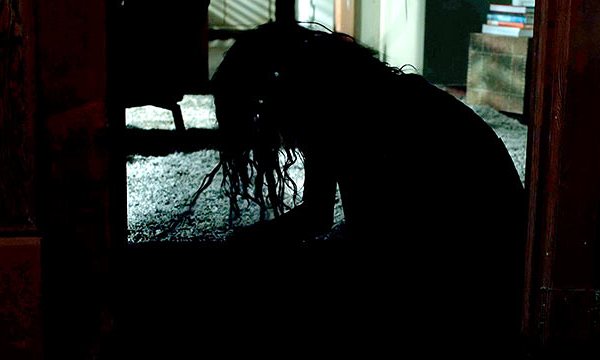A woman cowers beneath her bedclothes, building a useless barrier against the thing she hears creeping and scraping across the room, the thing that only appears when she turns off the light. This is the most primal image of domestic terror in the homemade short film whose viral success took its Swedish director, David F Sandberg, to Hollywood.
The full-scale expansion of Lights Out he made there has a similarly effective moment, when its young heroine Rebecca (Teresa Palmer) awakes to the sound of long nails dragging along her bedroom floor, where a shadowy, long-haired figure hunches. And if the light fails, it’ll leap. I kept the brace position ready for about an hour after that. But Lights Out relaxes its grip so much, the dark actually stops being scary. It’s a horror film that’s too nice to horrify.
 Rebecca’s stepfather was, unbeknownst to her, an early victim of the shadow-monster, Diana. When Rebecca reluctantly returns to the home of her estranged, mentally ill mother, Sophie (Maria Bello), to see what’s ailing her little brother Martin (Gabriel Bateman, pictured below), she soon discovers that Sophie has become inseparably devoted to Diana, a manipulative friend from mental hospital days, whose issues with light sensitivity came to a sticky end. Diana is now a malevolent ghost, in a house kept curtained and crepuscular for her. “Mom? How about just you and me tonight?” Martin asks as they settle down to watch a film. “We’ll see...” Mom grimly replies.
Rebecca’s stepfather was, unbeknownst to her, an early victim of the shadow-monster, Diana. When Rebecca reluctantly returns to the home of her estranged, mentally ill mother, Sophie (Maria Bello), to see what’s ailing her little brother Martin (Gabriel Bateman, pictured below), she soon discovers that Sophie has become inseparably devoted to Diana, a manipulative friend from mental hospital days, whose issues with light sensitivity came to a sticky end. Diana is now a malevolent ghost, in a house kept curtained and crepuscular for her. “Mom? How about just you and me tonight?” Martin asks as they settle down to watch a film. “We’ll see...” Mom grimly replies.
Sandberg had experienced Hollywood horror producers including James Wan (director of Saw from his own low-budget prototype) to help, as he set foot on a set for the first time. His film joins a prolific production line of slick, sometimes highly creepy, extremely profitable horror franchises (such as Wan’s Insidious). None strike out for new genre territory, as poetic outliers such as It Follows and The Witch have. Sandberg’s contention that his shadow monster represents Sophie’s clinical depression isn’t achieved – and if Diana is the black dog, the ending gives a bleak solution. An already green-lit, Aliens-style sequel is promised, presumably with dozens of the critters, and mental health low on the agenda.
 Practised genre screenwriter Eric Heisserer slips in a couple of witty touches, and a surfeit of unwise splitting up and badly wired lights. Lights Out’s Swedish director also leads a smorgasbord of talent, led by strong Aussie actresses Bello and Palmer, and Bateman’s convincing turn as a traumatised, brave boy. But as Sandberg’s monster is over-explained and over-exposed (just as the Jaws shark was best unseen and underwater, Diana only works when she is in the dark), this becomes a very safe rollercoaster ride. It’s a pleasingly matriarchal world, with Catherine’s boyfriend (Alexander DiPersia) amiable eye-candy as she takes cares of business, but an often brightly lit, conservative one, where Goth posters and a bong mark her as an unfit guardian. Starting full of dark promise, Lights Out becomes a mechanical, family action film made with kid gloves. It left me begging to be scared.
Practised genre screenwriter Eric Heisserer slips in a couple of witty touches, and a surfeit of unwise splitting up and badly wired lights. Lights Out’s Swedish director also leads a smorgasbord of talent, led by strong Aussie actresses Bello and Palmer, and Bateman’s convincing turn as a traumatised, brave boy. But as Sandberg’s monster is over-explained and over-exposed (just as the Jaws shark was best unseen and underwater, Diana only works when she is in the dark), this becomes a very safe rollercoaster ride. It’s a pleasingly matriarchal world, with Catherine’s boyfriend (Alexander DiPersia) amiable eye-candy as she takes cares of business, but an often brightly lit, conservative one, where Goth posters and a bong mark her as an unfit guardian. Starting full of dark promise, Lights Out becomes a mechanical, family action film made with kid gloves. It left me begging to be scared.
Overleaf: watch the trailer to Lights Out, and the original short film
David Sandberg and Lotta Losten's original Lights Out short:















Add comment